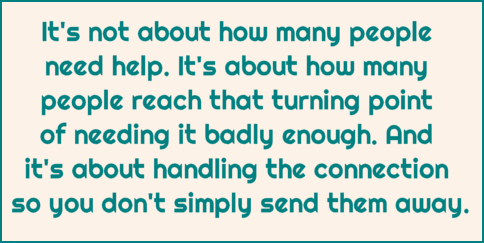I’ve been working on updating the AdvoConnection Directory website because it was time, because search engines look favorably upon updates. And because my not-frequent-enough review of the site’s analytics produced a big surprise!
A surprise I’ll share with you here today.
To be clear – no changes were made to the actual search and profile areas – those all belong to our listed advocates who make those changes themselves.
Instead, I edited and updated the support pages – everything from the homepage, to the About Us page, to the “how to choose and interview an advocate” page.
For some background: I monitor and track the advocate listing pages diligently (and encourage our listed members to monitor their own – we provide them with stats each month.). I know people are finding our advocates in the Directory in HUGE numbers (examples: 16,000+ in January and 15,500+ in February, a shorter month, of course).
However – true confessions here – as in “do as I say, and not as I do” – I rarely look at the analytics on the basic site pages. Just not something I make time for… although as I learned this week – I should! Because I was actually very surprised by what I learned.
What I found:
First, that beyond the profiles, the MOST accessed page is the one entitled, “How Much Does It Cost to Hire an Independent, Private Advocate?”. That really wasn’t a surprise…
Found on the other pages is supporting information like master list of services advocates provide, an About Us link, lots of blog posts to help patients become smarter and savvier…
 So what elicited such surprise? That the SECOND MOST accessed page is the one called, “How to Interview and Hire a Patient Advocate“. I don’t know why it surprises me… but it does. (Honestly, I expected the list of services to be at the top and it’s not.)
So what elicited such surprise? That the SECOND MOST accessed page is the one called, “How to Interview and Hire a Patient Advocate“. I don’t know why it surprises me… but it does. (Honestly, I expected the list of services to be at the top and it’s not.)
More importantly, it made it obvious to me that I needed to point this out to all of YOU, because it informs you of what questions will be asked when people reach out to you.
Thus today’s post. Just exactly how DOES a patient or caregiver decide how to hire you?
So let’s take a closer look:
First – take a look at the list of interview questions they are encouraged to ask you. Some of them are simply answered: a list of your credentials, whether or not you have liability insurance, whether you’re being paid by someone else, and whether you have references.
But others take a measure of skill on your part to answer them in a manner that will be acceptable – and will get you hired.
- Whether you have experience dealing with a situation similar to their own.
- What do you charge for your services?
- How much time will it take you to handle the services I need?
- How many people do you work with at one time?
Are you prepared to answer these questions? Can you do so comfortably (like a savvy business person) yet with enough regard for the sensitivity to the subject?
There are others that may require further explanation, such as those that overcome objections you’ll hear (“I don’t think I can afford you” or “I get an advocate at the hospital for free, so why should I pay you?”).
Are you prepared to answer those questions, too?
It has become quite apparent that smart patients and caregivers who want to hire an advocate are taking the time to learn what questions to ask. Smart, independent, private advocates know how they will answer them.

If you haven’t prepared yet for this sort of interview, what are you waiting for? Here is some information to get you started:
Smart independent advocates know their ability to succeed will depend on their ability to be interviewed. Now is the time to improve those skills.
MASTER LIST OF PRACTICE RESOURCES |LEARN ABOUT APHA MEMBERSHIP |IMPROVE YOUR PRACTICE






Thank you for all you do. Lots of work goes into the website, I’m sure. I always seem to have major issues maneuvering and navigating the site. I am going to blame it on me using a Mac. There is a fine balance between income generating activities and time spent on the computer posting and learning. Always appreciate your information.
Trisha,
What a timely article. A potential client called yesterday having found us on the directory and at the end of the discussion he said, “it says here that I should ask about references, so do you have any that are relevant to this case?” The answer was yes (if they hire us, this will be my fourth pancreatic cancer client) and today they are speaking to a client of mine whom I reached out to last night with this same cancer.
Delighted to hear you are spending some time on the directory. Based on our calls, I feel like it is a growing part of our referrals.
AnnMarie McIlwain
http://www.patientadvocators.com